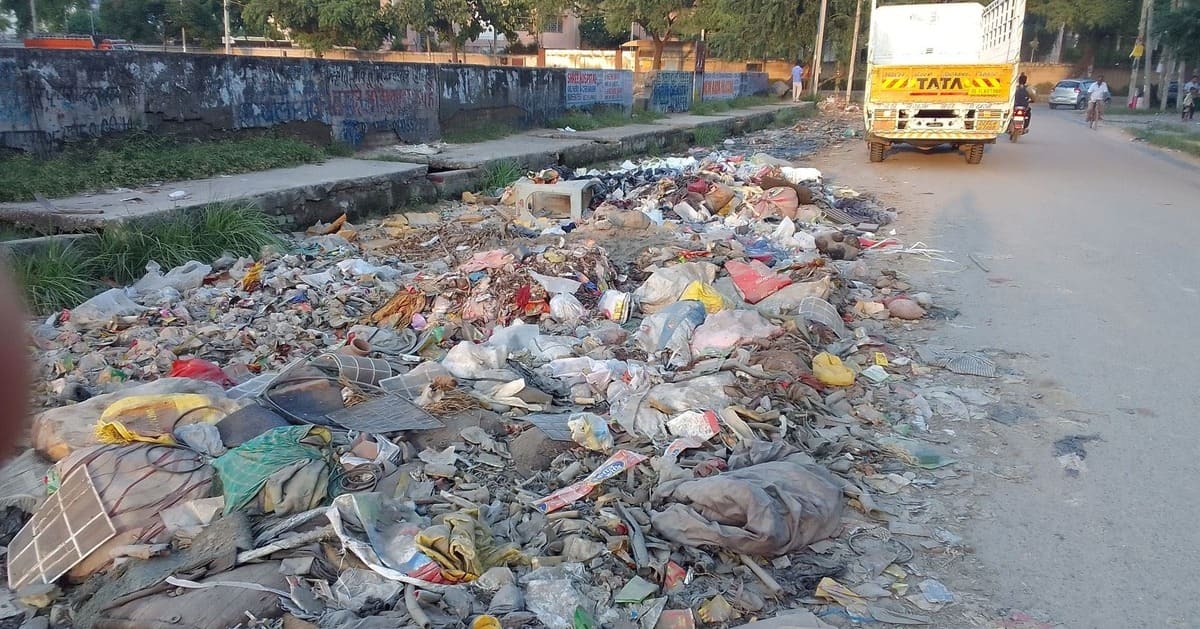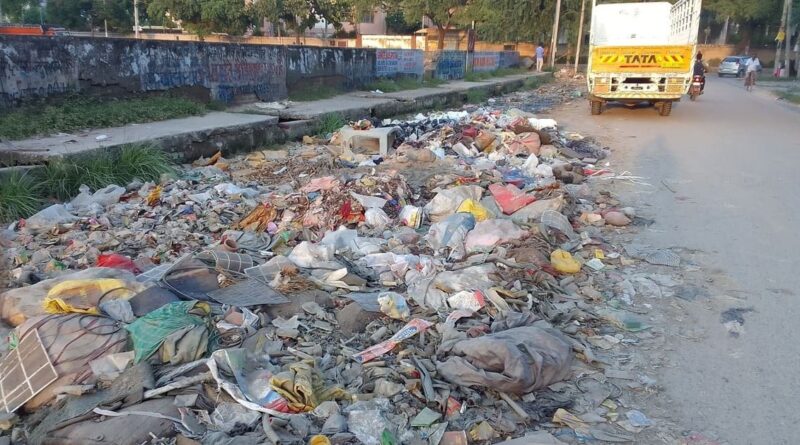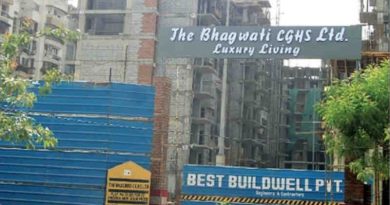Systemic Collapse: An Investigative Report on Corruption and Negligence in Delhi’s Administration

Systemic Collapse: An Investigative Report on Corruption and Negligence in Delhi’s Administration
In the face of systemic administrative failure, citizen action is no longer an option but a necessary antidote.
By Rakesh Raman
New Delhi | October 3, 2025
1.0 The Visible Crisis: Urban Decay as a Symptom of Governance Failure
A city’s health is written on its streets. In New Delhi, those streets tell a story of systemic collapse, where sprawling piles of filth are not just a failure of sanitation but a visceral symptom of a government in decay. The pervasive neglect on display is a direct manifestation of a profound and deep-rooted institutional failure.
A disturbing photograph from the RMN News Service reveals an undeniable truth: a Delhi road being consumed by a “massive, sprawling pile of waste and filth.” The image captures a public thoroughfare transformed into a hazardous dump, a testament to the alarming absence of effective administration capable of performing its most fundamental civic duties.
The direct public welfare consequences of this neglect are severe and multifaceted. This administrative breakdown poses immediate and tangible threats to the city’s residents.
Public Health Hazard: Such widespread filth creates an ideal environment for pests and pathogens, becoming a “breeding ground for life-threatening diseases” that directly endanger the community.
Public Safety Hazard: The sheer volume of debris encroaching on roadways presents “serious risks of accidents for commuters and pedestrians” who must navigate these obstructed and unsafe public spaces.
This visible decay, however, is merely a symptom. To understand the cause, one must look deeper into the administrative bodies responsible for preventing it.
2.0 The Accusation: Pervasive Corruption in Delhi’s Core Administrative Bodies
The fundamental responsibility for ensuring civic order, public health, and urban development in the national capital rests with key administrative bodies. The integrity of the Delhi Government, the Delhi Development Authority (DDA), and the Municipal Corporation of Delhi (MCD) is paramount. When these institutions are compromised by corruption, the impact is catastrophic.
According to an RMN News Service report, these three specific government bodies are implicated in “large-scale corruption.” These government bodies, condemned in the report as “sarakari parasites,” are allegedly ignoring citizens’ complaints, allowing public spaces to decay unchecked.
[ 🔊 दिल्ली की सड़कों पर कूड़े का ढेर और कुशासन: ऑडियो विश्लेषण ]
👉 You can click here to see more such pictures of horrendous conditions in Delhi.
This is not simply neglect; it is the predictable outcome of a system where accountability has been commodified. When officials allegedly ignore citizen complaints and enforcement is selective, a vacuum is created where civic order cannot survive. The filth on the streets is the physical manifestation of this accountability void.
This rot within Delhi’s core institutions, however, is not the only front. A parallel and equally corrosive strain of corruption is thriving at the hyper-local level: inside the city’s housing societies.
3.0 A Parallel Rot: Criminality and Complicity in Cooperative Group Housing Societies (CGHS)
Cooperative Group Housing Societies (CGHS) are a cornerstone of urban living in Delhi, yet the governance crisis extends deep into these communities. The investigation reveals a microcosm of the city’s broader administrative failures, where criminality directly threatens the safety, security, and financial stability of residents.
Management Committees (MCs) within numerous Delhi CGHS are allegedly engaged in a pattern of harmful illegal activities that move beyond mismanagement into the realm of outright criminality. These include:
* Illegal Construction
* Extortion
* Intimidation
The alleged ecosystem of bribery within housing societies—implicating politicians, bureaucrats, and police—is not a separate problem. It is the same machinery of systemic corruption seen in the DDA and MCD, simply scaled down to a neighborhood level. This pattern of impunity proves the rot is not confined to central offices but has metastasized throughout the city’s administrative capillaries, leaving residents vulnerable and without recourse.
This environment of widespread rot necessitates citizen-led initiatives to challenge the status quo and demand accountability.
4.0 Citizen Empowerment: Channels for Demanding Accountability
In the face of systemic administrative failure, citizen action is no longer an option but a necessary antidote. When official channels are compromised, platforms that empower residents to pierce the veil of official indifference become the primary tools for demanding justice. The initiatives established by the RMN News Service represent a structured effort to empower Delhi’s residents to combat the pervasive negligence and corruption affecting their daily lives.
The news service offers two distinct platforms to address different facets of the governance crisis:
1. “Clean House” Service
This specialized online service, operational for seven years, is designed to assist residents of Cooperative Group Housing Societies. It provides a dedicated channel for them to file complaints against the alleged crime and corruption committed by their management committees.
2. RMN Consumer Rights Network (CRN)
This is a free, public-interest online initiative that empowers citizens to combat a broader range of issues, including “corporate fraud, misleading advertising, unsafe products, and, critically, government negligence.”
The overarching message to the residents of Delhi is a clear call to action. The report emphasizes that active participation through these channels is “vital to demand accountability and enforce the fundamental changes needed.” Civic engagement is presented not merely as an option but as an imperative for creating a safer, healthier, and more just city.
5.0 A Narrative of Systemic Failure
The evidence is undeniable: from hazardous dumps masquerading as public roads to the alleged complicity enabling criminality in housing societies, Delhi is suffering from a wholesale governance collapse. The central thesis, underscored by the journalistic work of Rakesh Raman and the RMN News Service, is that these are not a series of isolated failures but an interconnected system of negligence and corruption. The inability to manage basic sanitation, the dismissal of citizen complaints, and the unchecked criminal activity all point to a government apparatus that is failing its citizens on every fundamental level.
Restoring the capital’s health requires not mere policy adjustments, but a radical and immediate restoration of accountability. A profound and systemic reform, centered on transparency and the principle of public service, is urgently needed to reclaim the safety, health, and welfare of Delhi’s citizens.
By Rakesh Raman, who is a national award-winning journalist and social activist. He is the founder of a humanitarian organization RMN Foundation which is working in diverse areas to help the disadvantaged and distressed people in the society.
💛 Support Independent Journalism
If you find RMN News useful, please consider supporting us.




